7 Best Herbal Tinctures For Cirrhosis
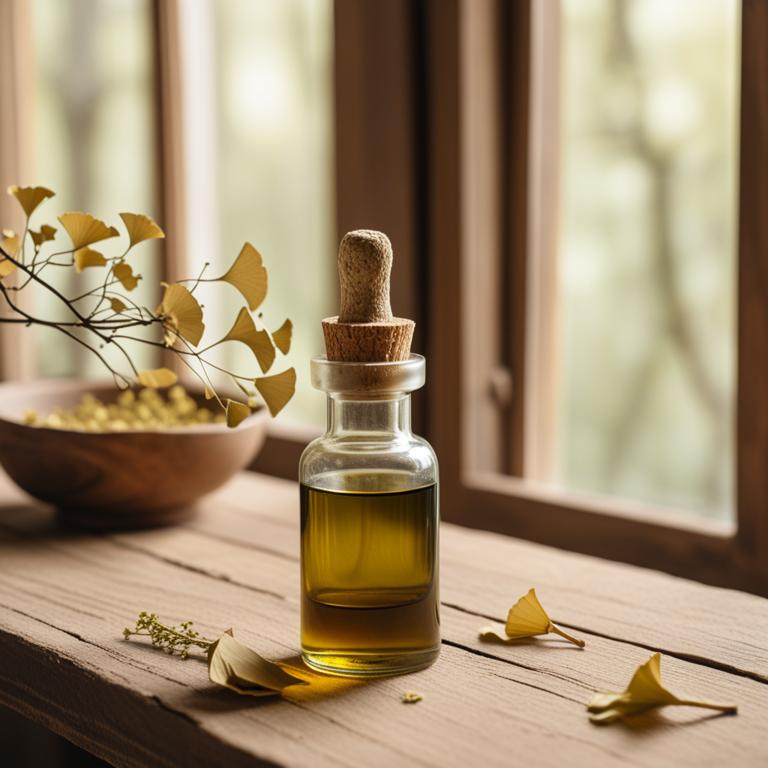
Herbal tinctures for Cirrhosis are concentrated plant extracts that are typically used to treat liver disease, including cirrhosis, by promoting liver health and reducing inflammation.
The benefits of herbal tinctures for cirrhosis include improved liver function, reduced oxidative stress, and enhanced antioxidant activity, which can help slow the progression of the disease.
Examples of herbal tinctures that have been traditionally used to treat cirrhosis include Milk Thistle, which contains silymarin, a powerful antioxidant that protects liver cells; Dandelion root, which stimulates liver function and promotes detoxification; Turmeric, which contains curcumin, a potent anti-inflammatory compound; and Licorice root, which has anti-inflammatory and antioxidant properties that soothe and protect the liver.
Additionally, other herbal tinctures such as Echinacea, Ginger, and Schisandra have also been used to support liver health and reduce inflammation associated with cirrhosis.
According to the study in "Phytotherapy research : PTR", tinctures for cirrhosis, specifically those made from silymarin, curcumin, and ginseng, have shown beneficial effects in patients, including improvements in liver enzyme levels, quality of life, and other clinical indicators.
Below there's a list of the 7 best herbal tinctures for cirrhosis.
- 1. Silybum marianum tinctures
- 2. Glycyrrhiza glabra tinctures
- 3. Viscum album tinctures
- 4. Taraxacum officinale tinctures
- 5. Cynara cardunculus tinctures
- 6. Curcuma longa tinctures
- 7. Astragalus membranaceus tinctures
Also you may be interested in...
TODAY'S FREE BOUNDLE
Herb Drying Checklist + Herbal Tea Shopping List + Medicinal Herbs Flashcards
Enter you best email address below to receive this bundle (3 product valued $19.95) for FREE + exclusive access to The Aphotecary Letter.
$19.95 -> $0.00
1. Silybum marianum tinctures
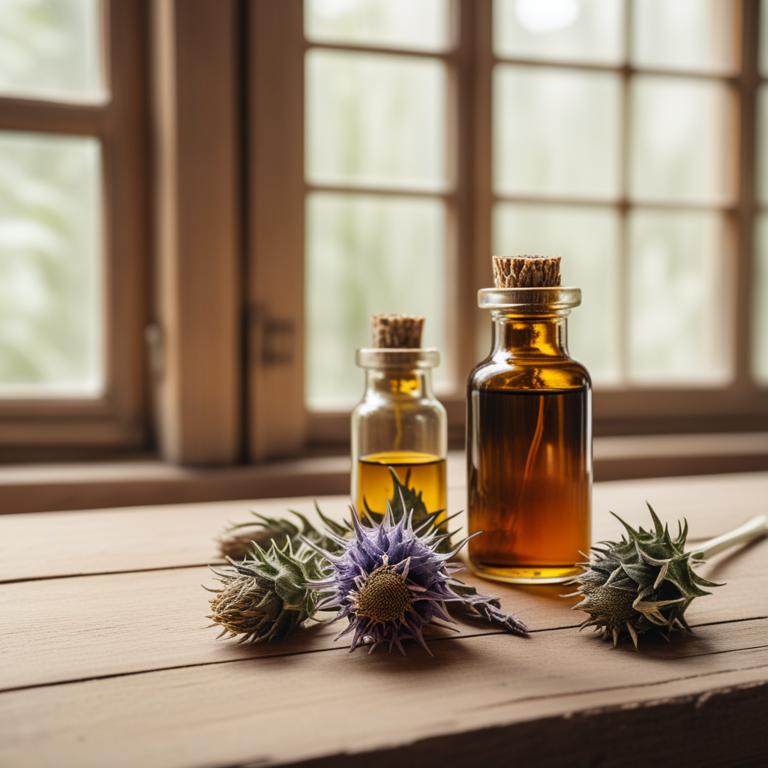
Silybum marianum tinctures, also known as milk thistle tinctures, have been traditionally used to treat cirrhosis, a condition characterized by liver inflammation and scarring.
The silymarin complex, a bioactive constituent of Silybum marianum, exhibits antioxidant and anti-inflammatory properties that help protect liver cells from damage and promote liver regeneration.
By reducing oxidative stress and inflammation, silymarin complex helps to alleviate symptoms of cirrhosis, such as fatigue and jaundice, and supports the overall health of the liver.
The benefits of Silybum marianum tinctures in treating cirrhosis include improved liver function, reduced risk of liver failure, and enhanced overall quality of life for patients.
Related Study
According to the study published in "Phytotherapy research : PTR", Silybum marianum tinctures, specifically silymarin, showed beneficial effects on cirrhosis in three out of six studies, including improvements in aspartate aminotransferase (AST) and alanine aminotransferase (ALT) levels.
2. Glycyrrhiza glabra tinctures

Glycyrrhiza glabra tinctures have been studied for their potential in treating cirrhosis, a chronic liver disease characterized by scarring and loss of liver function.
The anti-inflammatory and antioxidant properties of this herbal preparation may help to reduce liver inflammation and damage, promoting liver health and regeneration.
Bioactive constituents such as glycyrrhizin, flavonoids, and triterpenoids present in Glycyrrhiza glabra tinctures have been shown to exhibit hepatoprotective effects, including anti-fibrotic and anti-apoptotic properties, which can help to slow down the progression of cirrhosis.
The benefits of using Glycyrrhiza glabra tinctures to treat cirrhosis include improved liver function, reduced oxidative stress, and enhanced overall well-being, making it a promising natural therapy for this condition.
Related Study
According to the study, Glycyrrhiza glabra tinctures have been shown to be hepatoprotective, meaning they offer liver protection, particularly in the context of treating liver diseases such as cirrhosis.
3. Viscum album tinctures
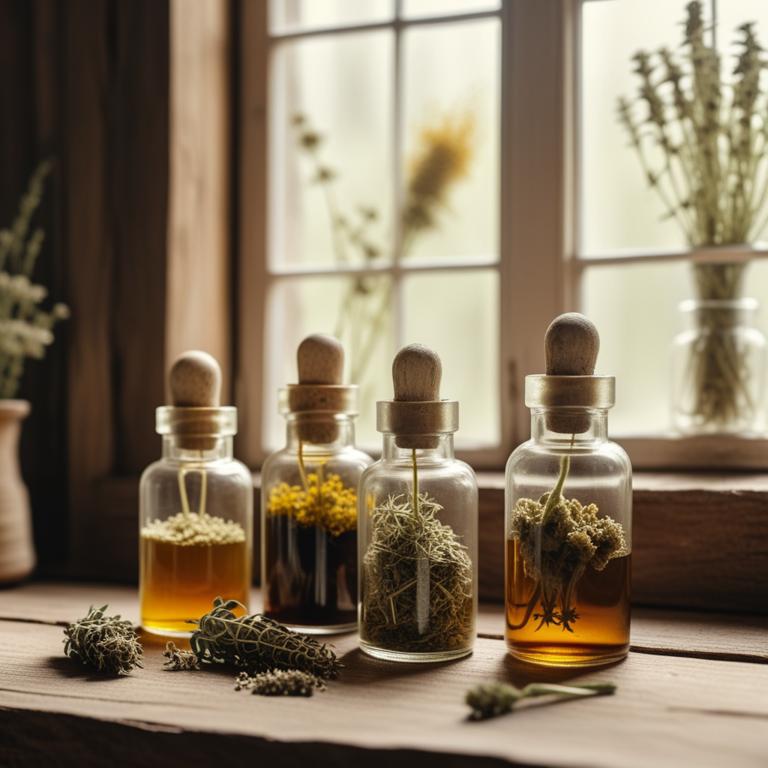
Viscum album tinctures have been studied for their potential in treating cirrhosis, a chronic liver disease characterized by scarring and inflammation.
The tinctures' properties, including their anti-inflammatory and antioxidant effects, help to reduce liver damage and promote tissue repair.
The bioactive constituents of Viscum album, such as iridoid glycosides and oligosaccharides, are believed to contribute to its therapeutic effects by modulating immune responses and reducing oxidative stress.
By using Viscum album tinctures, individuals with cirrhosis may experience benefits including improved liver function, reduced inflammation, and enhanced overall health.
4. Taraxacum officinale tinctures
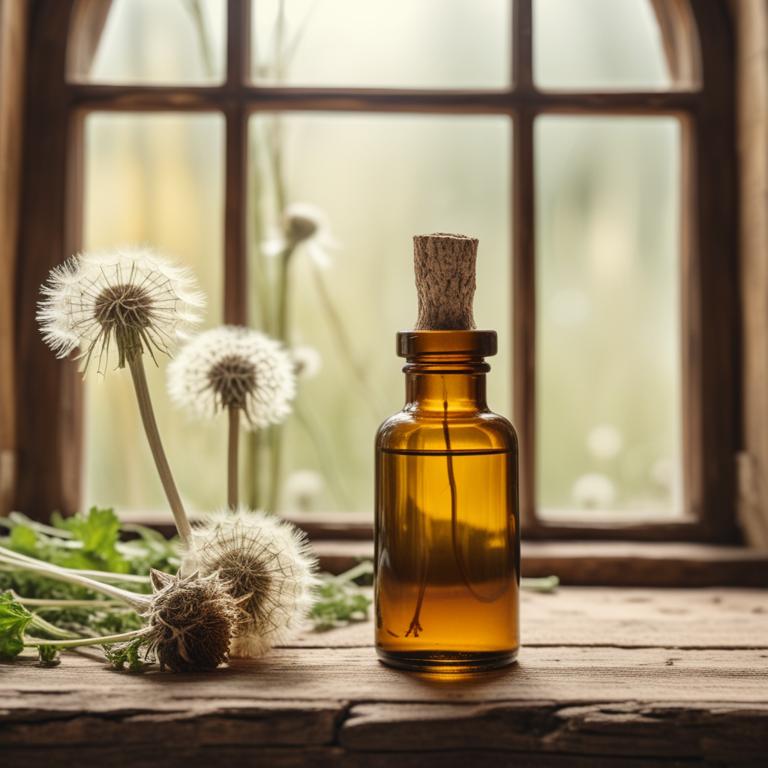
Taraxacum officinale tinctures, derived from the dandelion plant, have been studied for their potential in treating cirrhosis, a liver disease characterized by scarring and fibrosis.
The bioactive constituents of this herbal preparation, including flavonoids, terpenoids, and phenolic acids, are believed to have anti-inflammatory and antioxidant properties that help to mitigate liver damage and promote liver regeneration.
By reducing oxidative stress and inflammation in the liver, Taraxacum officinale tinctures may help to slow the progression of cirrhosis and improve liver function.
The benefits of using Taraxacum officinale tinctures to treat cirrhosis include reduced liver fibrosis, improved liver enzyme levels, and enhanced overall liver health.
5. Cynara cardunculus tinctures

Cynara cardunculus tinctures have been studied for their potential in treating cirrhosis, an advanced stage of liver scarring.
The tinctures contain bioactive constituents such as silymarin, flavonoids, and phenolic acids that help to protect liver cells from damage and promote regeneration.
By inhibiting fibrogenesis and reducing oxidative stress, these herbal preparations may help alleviate symptoms of cirrhosis and improve liver function.
The benefits of Cynara cardunculus tinctures in treating cirrhosis include reduced inflammation, improved antioxidant defenses, and enhanced liver detoxification processes.
6. Curcuma longa tinctures

Curcuma longa tinctures have been traditionally used to treat cirrhosis, a chronic liver disease characterized by scarring and inflammation.
The bioactive constituents of Curcuma longa, including curcumin, demethoxycurcumin, and bisdemethoxycurcumin, possess potent anti-inflammatory and antioxidant properties that help to reduce liver inflammation and damage.
The tinctures of Curcuma longa work by inhibiting the production of pro-inflammatory enzymes and cytokines, as well as promoting the regeneration of liver cells, ultimately leading to improved liver function and reduced symptoms of cirrhosis.
The benefits of using Curcuma longa tinctures to treat cirrhosis include reduced liver damage, improved liver function, and a decrease in the risk of complications associated with the disease.
Related Study
According to "World journal of gastroenterology", Curcuma longa tinctures for cirrhosis may be beneficial as Curcuma longa (CL) showed nearly normal histology with minimal inflammation and microvesicular steatosis, and prevented hepatotoxicity by restricting the rise of AST by 2-fold in a study comparing the hepatoprotective and immunomodulatory effects of four herbs on liver injury induced by Isoniazid and other compounds.
7. Astragalus membranaceus tinctures
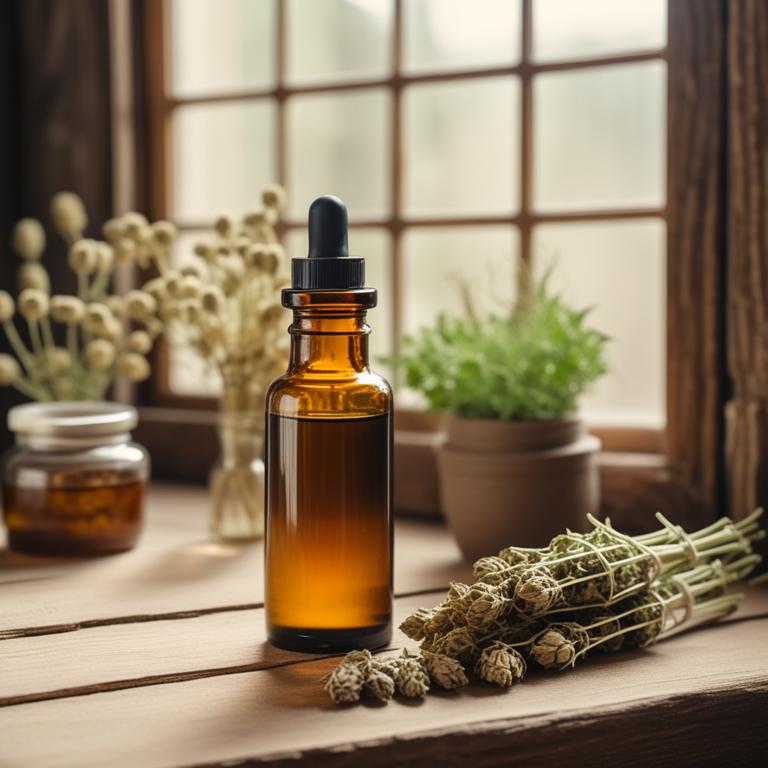
Astragalus membranaceus tinctures, derived from the root of the Astragalus plant, have been traditionally used to treat cirrhosis due to its anti-inflammatory and antioxidant properties.
The bioactive constituents, including flavonoids, saponins, and polysaccharides, help to improve liver function, reduce fibrosis, and promote liver regeneration.
By modulating the immune system and reducing oxidative stress, Astragalus membranaceus tinctures can help alleviate symptoms of cirrhosis, such as fatigue, jaundice, and ascites, and potentially slow disease progression.
The benefits of using Astragalus membranaceus tinctures to treat cirrhosis include improved liver function, reduced inflammation, and enhanced overall quality of life for patients.